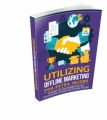
 License Type: Resell Rights
License Type: Resell Rights  File Size: 1,044 KB
File Size: 1,044 KB File Type: ZIP
File Type: ZIP
 SKU: 17843
SKU: 17843  Shipping: Online Download
Shipping: Online Download
Ebook Sample Content Preview:
Since entrepreneurs are wearing all the hats in their business, every little shortcut or tip that makes life easier is always welcome. Let me share some “been there-done that” information with you to make your business life a little easier.
Office furnishings and decorations say a great deal about you, so to convey the image you want to convey pay attention to these:
Furniture Arrangement: Setting your desk in the middle of the floor with chairs facing it conveys a “formal” atmosphere. It conveys to your clients that you want to maintain a distance from visitors. Instead, place your desk against a wall (not facing it) to convey confidence.
Messy Desks: A small amount of messiness implies comfort and
friendliness, but too much clutter makes visitors think you don’t care about making a good impression on anyone. The opposite extreme, an immaculate desk conveys coldness and could be perceived as you not having enough work to do.
Decorations: Plants, drapes, and artwork will convey a comfortable, relaxed attitude. Books and artwork express your sincerity.
Awards & Certificates: If job-related, they reassure visitors that you are experienced and competent.
Planning is essential for the entrepreneur, and all you need is 30 minutes to plan your entire week if you use the OATS formula.
Objectives: What results do you want to have by week end? Write them down and rank them.
Activities: List the necessary activities you must do to achieve your goals, and rank them.
Time: How much time will each activity require? Plan realistically allowing more time than you think you’ll need to compensate for unexpected problems.
Schedule: Look at your calendar and decide when you can do each activity. Most people underestimate the power of a schedule, but you won’t accomplish anything if you don’t schedule the time.
Underlining reading material is another great timesaver. With the mountains of material entrepreneurs must read to keep abreast of their niche, being able to find it again when you need it is essential. After you’ve read the article/book/paper/report, then go back and underline the important information so you can find it again easily. The reason for underlining after you has read it. is because most of us underline too many words before we’ve finished the passage and understand the key points. Wait until you’ve finished an entire section or chapter, then go back and highlight key points.
Returning phone calls is another time-stealer for entrepreneurs. Time-management experts recommend setting aside an hour a day to make and return your phone calls. But which hour do you choose? The best times of day are the first two hours of the morning or the last two hours of the afternoon. Those are the times when most people are in the office and accessible.
Do you think business is doing better because of your optimistic attitude? I would think so. However many management experts are now saying that pessimists make better managers. Why? Because they’re always thinking of what could go wrong and are coming up with solutions to problems in case the worst happens. My suggestion is not to toss your optimism away, I’ve found it very helpful some days, instead force yourself to write down everything that could go wrong with a new project, ideas, or employees. (Remember “Murphy’s Law - Whatever can go wrong, will.”) Personally, I think Murphy was an optimist! My advice is to be optimistic but be prepared. Once you do this you’ll naturally be prepared with solutions if disaster does strike.
In this present age of computers and time-saving gadgets, we are at times prone to purchasing the latest thing that promises to save us some work. When it comes to purchasing software, a good question to ask yourself is: Is it better than a pencil? The answer will help you decide if the expense is really justified. Keep in mind that computers are supposed to make your work easier and faster.
For the entrepreneur that travels overseas often, consider registering your handprint with the U.S. Immigration and Naturalization Service and obtaining an INSPASS card. It’s not exactly Star Trek technology, but it’s close. With the card, all you have to do is slide it through a machine, press your hand against a screen, and slip on through bypassing the lines. For information wit to: INSPASS, P.O. Box 2010, Newark, NJ 07114-2010
Want to impress your clients with Broadway shows? Call the Actor’s Fund of America and ask for “Fund Tix”, 212-221-7300. The tickets are double the price, but half goes to charity (tax write off) and the seats are great.
Are there days when you want to give up? Is your family telling you you’re too old to try something new? Well age isn’t always a factor in your success or failure. Consider these famous examples:
Actor George Burns won his first Oscar at age 80.
Golda Meir was 71 when she became prime minister of Israel.
At 96, playwright George Bernard Shaw broke his leg falling out of a tree he was trimming in his backyard.
Painter Grandma Moses didn’t start painting until she was 80 years old. She completed more than 1,500 paintings after that; 25% of those were produced when she was past 100.
Michelangelo was 71 when he painted the Sistine Chapel.
Albert Schweitzer was still performing operations in his African hospital at 89.
Doc Counsilman, at 58, became the oldest person ever to swim the English Channel.
S. I. Hayakawa retired as president of San Francisco State University at 70, and then was elected to the U.S. Senate.
Casey Stengel didn’t retire from managing the New York Mets until he was 75.
Entrepreneurs often have crazy ideas for making money and giving good customer service. The next one you have, remember the story of Phil Romano the founder of Fuddruckers the national hamburger chain. He once owned a small, out-of-the-way Italian restaurant called Macaroni’s. He packed the place every Monday and Tuesday nights, a time when most restaurants struggle to keep their doors open. How? Apart from the obvious fact that Macaroni’s served good food, Romano had a “gimmick” based on the old Psych 101 principle, “Random rewards beget regular behavior.”
If you happened to be dining there on a randomly chosen Monday or Tuesday night, you and the other 200 customers received a letter instead of a bill at the end of the meal. The letter stated that because the Macaroni mission was to make you feel like guests, it seemed awkward to charge guests for having a good time. So, once each month on a Monday or Tuesday, and always unannounced, everyone would eat free.







